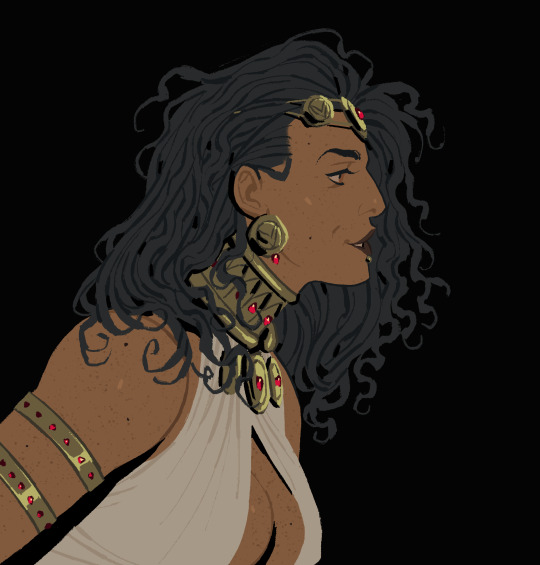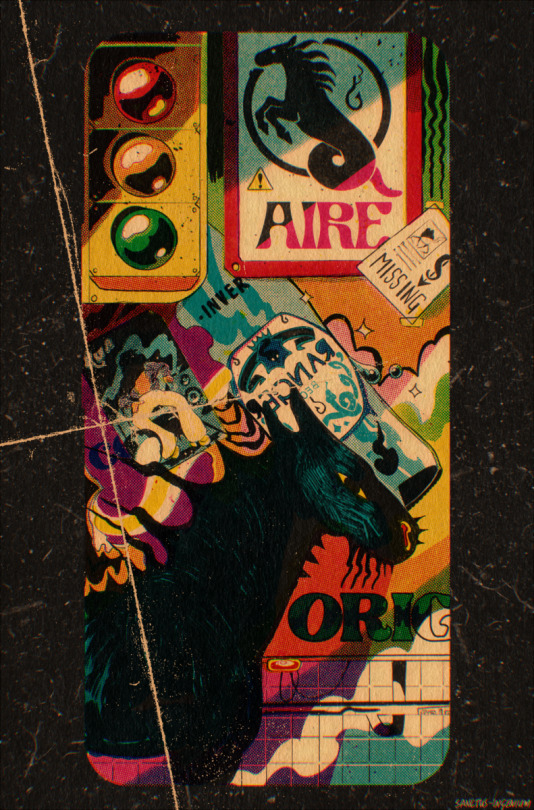Text


Art Club: photo study with requested Progress video! For @jaynotjunior

2K notes
·
View notes
Text


Divinity and machinery forged together into a being meant to serve humanity. However, one has to pray for it to not see how much more superior she is to flesh.
Hello! I bring a more properly finished piece of Argyros (my aasimar/warforged cleric), at long last! I wanted her to look more divine and about to cause big holy-flavoured trouble. Despite her sillyness, she can manage to be scary when needed-
699 notes
·
View notes
Text
Listen if the study of ancient humans doesn’t make you at least a little bit emotional idk what to say.
I started crying today at the museum because they had reconstructed the shoes of Otzi the iceman.
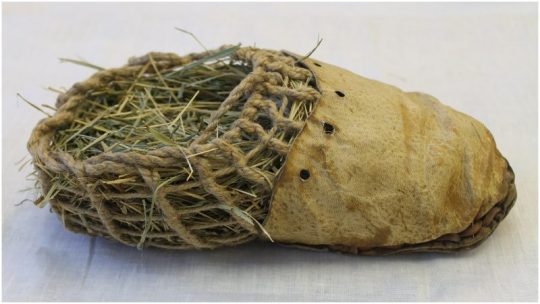
Either he or someone he knew who cared about him made these shoes out of grass and bear skin and twine and he was wearing them when he died over five thousand years ago.
And a Czech researcher and his students did reconstructions of these shoes and wore them to the same place where he died to test them out and they were like yep! These shoes are really cozy and comfy and didn’t give us blisters while hiking!
Is that not just the coolest shit ever????
100K notes
·
View notes
Text
Okay let me add my five cents to the Zaunite au, where Viktor didn’t make it to the academy and remained in Zaun.
He was trying to invent on his own, but he desperately needed money for his research. And that’s when Silco appeared…


41K notes
·
View notes
Text





Stewpot: Tales from a Fantasy Tavern by Takuma Okada.
Earlier in 2024 I had the pleasure of contributing to the Evil Hat publication of the tabletop role-playing game Stewpot, including the cover and an assortment of interior illustrations.
1K notes
·
View notes
Text
One of the stranger things about training brand new nurses is explaining how to min max small talk. It feels very weird to coach people on how to chat.
50K notes
·
View notes
Text
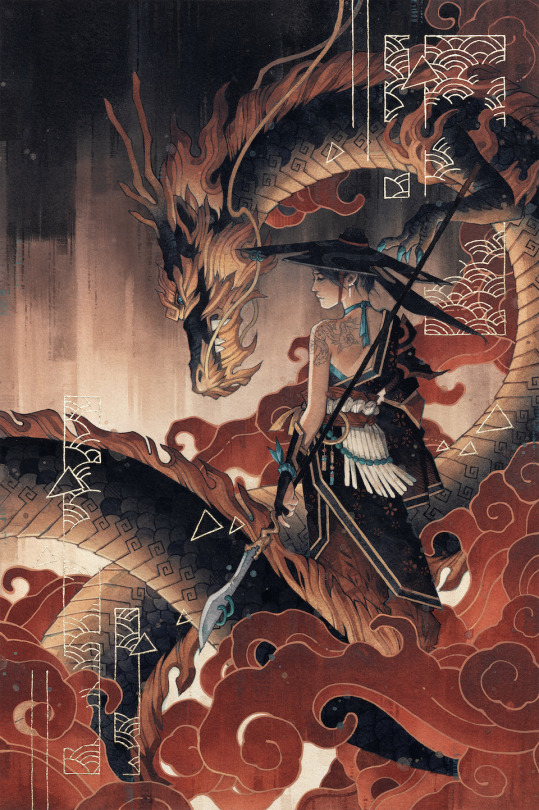
‘Of the Heavens’ — watercolor & mixed media on paper
This my first painting I created for my recent exhibition, ‘Fables’. I’ve always had a fascination for folktales around the world. These stories have always sparked wonder in my imagination as a kid, so I wanted to create my own personal interpretation of a few fabled creatures with respect to the traditions, symbology and legends where they come from. The first that came to mind was that of the Dragon, a creature prevalent throughout a lot of East Asian cultures and often symbolic of power, fortune and the divine. So, here’s my interpretation of the Dragon, blessed with auspicious jade eyes & claws 😄 #brbchasingdreams
prints | tutorials
14K notes
·
View notes
Text
Book Review: 'Clash of Steel: A Treasure Island Remix'
Clash of Steel: A Treasure Island Remix by C.B. Lee
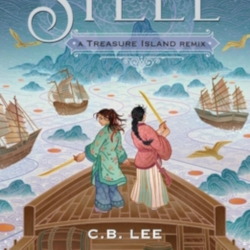
adventure
Asian fantasy
LGBTQIA
lesbian characters
mythology
pirates
queer books
romance
swashbuckling
ya fiction
My Review: 5 of 5 stars
At the farthest edge of what the westerners have historically branded "the opening of China," two young women discover the unmapped intersection of youth's uncultivated curiosity and the desperate proclivities of a dawdling adulthood. A CLASH OF STEEL begins painfully slow, but once all of the rightful pieces are in place, the novel's momentum churns forward with such unrelenting power that no amount of dramatic irony can outrun the book's satisfying conclusion.
Xiang's wistful gaze, from the rough mountains beyond her tiny river village, spy a curtain of distant ports and a mixed and matched fleet of merchant vessels. She lives in modest comfort, yes; and she has wont of little beyond the approval of her regularly absent mother, certainly; but what Xiang desires most is more. That is to say, the girl desires to stride the deck of a sea-worthy vessel, to taste and smell the vastness of a mercantile city a thousand times the size of her home tea shop, hear the myriad languages spoken by the myriad folks who sail the world's distant oceans. Xiang is an avid reader, but she wants to do more than read about adventure, she wants to experience it for herself (Xiang: "[W]ould I be satisfied merely listening to travelers' stories now that I've had a taste of the world?" page 273).
A chance trip to Canton, to visit her mother's center of business, enlightens Xiang to the possibility that she was born for more than being scolded by her tutor on lazy afternoons. Bandits running through alleys. Pirates and smugglers skulking the bay. Corrupt government officials absorbing bribes day-in and day-out. Trade for salt, fish, and more, are heavily tracked and regulated, but between the seams, the people of Canton, ephemeral, drift from one glimmering opportunity to the next, danger be damned.
The novel's opening act pivots grudgingly around the main character's misgivings for her simple, rural life, whereas the quickened pace of the book's later events makes for an effective contrast: life around narrow rivers and rice terraces versus life in the smoke-filled streets of a loud port city; life at a rural tea house with few visitors versus life among the raucous fools scratching for coin aboard patchwork ships. One has sympathy for readers who never made it past the first 80 pages.
A CLASH OF STEEL doesn't hit its pace until Xiang wields such opportunity by tagging along with her first new friend in ages, a pirate girl named Anh. Warm, brown skin. Wild hair. Talkative. Fearless.
Xiang's connection with Anh flares bright and hot, almost immediately, and the young woman is both enthralled and fearful of what that means. A CLASH OF STEEL nurtures and frames and scolds and builds back up Xiang and Anh's fledgling relationship, revealing, to those not previously aware, the author's skill in crafting queer characters worth believing in is nothing to worry about.
The lure of riches notwithstanding, boarding the Huyền Vũ and making for an island chain and a hidden hoard are the least of Xiang's troubles. After all, seeking to mend a fractured mother-daughter relationship by running away from home and pursuing a decades-old folktale thanks to an ancient, family relic? If that's not adventure, then what is?
A CLASH OF STEEL is a fun read for several reasons. Some such reasons pair well with the novel's reflection upon a long-eroded Age of Exploration. Others more to do with the book's structural arrangement and clever narrative positioning. What is the relationship between humanity and nature? What is humanity's relationship to itself when assimilation is believed inevitable? Why is the bond between government and the individual so heavily strained (stained) by greed? Relatedly, if there is no room for good people to conduct legitimate business, then does that mean freedom is only guaranteed through means of illegitimate business? (Xiang: "Who is more the thief: the government that preys on its people, or those who must become thieves in order to survive?" page 241)
Xiang stumbles into these questions and more while slowly transitioning from pampered countryside waif into a scraggly but sprightly shipmate with salt in her hair and a few splinters in her heels. The girl soon learns that an adventurous life is equally sought and earned.
Xiang's greatest education comes not from her trusted tutor, Master Feng Zhanli, who loves her like a daughter and protects her from the wrath of the girl's absent mother. Instead, Xiang learns kindness from the garrulous Captain Hoa Ngọc Hạnh; she learns steadfastness from shipmate Maheer, gentle and devout but indiscriminating; and she learns feminine ferocity from Ling Shan, a former courtier in the Forbidden City, who is now a skilled swordfighter whose tongue is a pit of vipers.
The book builds its tale of the modern imaginary on this foundation of furtive exploration. Readers of fairytales and folklore will recognize the author's exquisite use of a call to purpose, a lure from the quotidian, the foreshadowing of disappointment, the shifting standard for filial piety, and the introduction and subsequent destruction of a source of intrepid enlightenment. Tales of legendary pirate commanders? Stories about playful and distant relatives who only tease their benevolence? A CLASH OF STEEL is about leaving home on a treasure hunt, but it is also about unburying friendship and camaraderie from the embers of a discomfited life nobody truly asked for (Xiang: "I'm tired of others deciding my story for me," page 352).
❯ ❯ Book Reviews || ahb writes on Good Reads
2 notes
·
View notes
Text

The world of my new fantasy novel Seeker of the Lost Song is inspired by pre-colonial Filipino culture, as well as the medieval Swedish rule of Finland. Its sequel is additionally inspired by the later Russian control of Finland. Finnish history is a major inspiration for both novels, even though they’re not historical fantasy.
Lord of the Rings was the first fantasy novel I read, way back at the age of 13. I read the Silmarillion shortly after that, and fell deeply in love with the world, the mythology, and the language. I didn’t intentionally set out to model Seeker and Sequel after Tolkien’s work. I mean, they aren’t epic fantasy novels, and Tolkien’s specific flavour of worldbuilding has been done over and over ad nauseam.
However, there are five subtle ways that Tolkien’s influence has made its way into my work that I can’t deny.
(NB: Spoilers ahead for some of Tolkien’s work – proceed with caution!)
Read the full blog post here!
🧝🏼
4 notes
·
View notes
Text
The Water Outlaws review
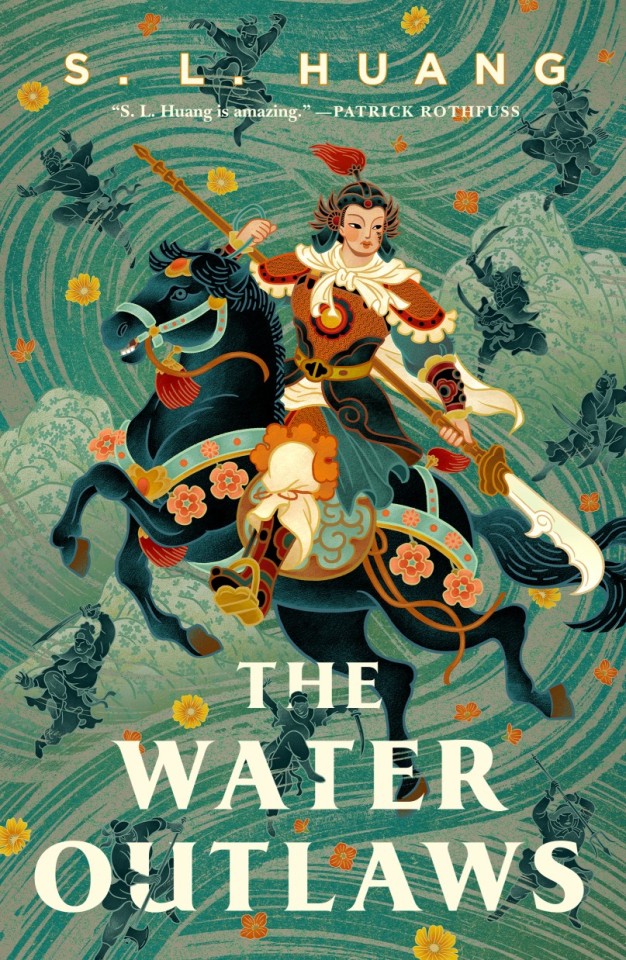
4/5 stars Recommended if you like: Wuxia fantasy, action adventure, renegade heroes, political intrigue Big thanks to Netgalley, Tordotcom, and the author for an ARC in exchange for an honest review! TW attempted sexual assault This book is interesting because the characters, by and large, don’t turn out to be who you think they’re going to be. I don’t mean in a bait and switch kind of way or that the characters experience growth, but rather a realistic way. The characters themselves have their own self-conceptions about who they are and what they would do in certain circumstances, just like we form perceptions of the characters, and then over the course of the book, those self-perceptions are repeatedly and thoroughly challenged to get at the heart of who the character actually is. Lin Chong, for instance, has a very strict code of values and believes in both justice and the law, but as the synopsis says, she ends up as a criminal running from the empire. So how does what she’s experienced and what she does next fit into her self-conception, if at all? I really enjoy how the characters answer these questions for themselves and it’s interesting to see internal conflict dealt with in this manner. The story is told in multiple POV, so we get multiple angles of the things happening both in the capital and in Liangshan. While it might seem redundant to have two POVs for both locations, I actually think it adds to the story because then we can see the various schemes and layers that are going into each move on both sides. Lin Chong is definitely a character that grew on me. She’s a straight arrow and believes the law, and empire, is just and that criminals are criminals for a reason. Unfortunately, she still struggles with the idea that the law can be wrong, that the government can be corrupt, even after she’s branded a criminal. I’m not a fan of characters who think like that, especially when the corruption is right in front of them, but Lin Chong grew on me. She started to question her own line of thinking and began putting those martial arts skills to use for a good, albeit illegal, cause. Once she decides to be loyal, then she’s loyal, and I liked seeing her friendships grow with the other women. Lu Junyi is a savvy intellectual who is a friend of Lin Chong’s before she has to go on the run. Surprisingly, Lu Junyi remains an important character throughout the story. When the book opens, Lu Junyi is a socialite who hosts salons where intellectuals can gather and debate anything from science to poetry to politics, with Lu Junyi often taking an active and liberal role in these meetings. As the book goes on, however, she’s faced with needing to put that knowledge to use in a dangerous endeavor. Like Lin Chong, she has to examine who she thinks she is and who she actually is. Lu Da is introduced as a friend of Lu Junyi’s but ends up becoming sworn-sisters with Lin Chong. In contrast to the other two women, Lu Da is brasher and more impulsive, interested more getting things done than in thinking things over thenacting. She’s an exceptionally loyal character and willing to fight to the end to protect those she cares about. Lu Da is also someone who isn’t afraid of owning up to their mistakes. At times her narrative did make her feel younger than she actually is, like a child in an adult’s body, which I wasn’t a fan of. Wu Yong is another bandit with Liangshan and is the major strategist of the group. While we did get her POV, it was hard to fully grasp her plans and motivations since so much was left unsaid. I didn’t really like her at first, but once we got a peek inside her head, I ended up liking Wu Yong a lot more. She has, as mentioned, a tactician’s mind and I liked seeing how she schemed and came up with contingency upon contingency. Cai Jing is the grand chancellor for the empire and is really a mixed bag. He’s definitely not a good person, but he’s also not totally unlikable (which is kind of shocking). He fully believes that everything he’s doing is for the good of the empire, which makes him a dangerous enemy to have. And like Wu Yong, he’s good at planning for multiple contingencies. With him as one of the antagonists, I really did question whether the Liangshan Bandits could/would win. The last 20% or so is probably my favorite. There’s a lot going on there but it’s fast paced and interesting. I liked the battle in particular since we get to see a lot of different strategies brought out and it’s really the only major showdown in the book, so I enjoyed being able to root for the bandits. I will say that I think this book could’ve been shorter. It was hard for me to get going and the action doesn’t really pick up until ~40-50% of the way through. I would’ve liked to see some of the earlier parts compressed so that we can get to the main plot faster. The science bits were kind of hard for me to follow. There was a lot of technical work going on and some of the speakers weren’t always coherent, so I had difficulty understanding what was happening. I know what the end goal of the experiments was, but I suppose I’m kind of confused still about what exactly the scientists were doing and how they were doing it. Overall this is a good book, particularly if you’re looking for an action/adventure. Some parts of it dragged and I found some parts hard to follow, but the Liangshan Bandits definitely make up for it and I enjoyed reading their parts.
33 notes
·
View notes
Text
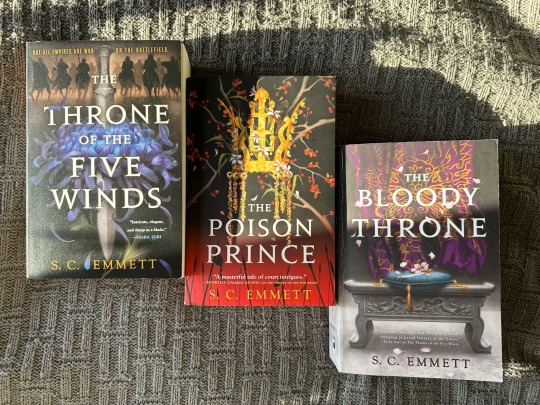
The Hostage of Empire trilogy by SC Emmett is a new favorite series of mine, so let me tell you why it's so great:
Courtly political fantasy set in a historical East Asian world
Super rich in detail and worldbuilding with several distinct countries and cultures
Princess Mahara and her lady, Yala, are sent to a neighboring country in an arranged marriage after a defeat in battle
Both women must navigate a difficult political landscape in a new country, all while the tensions between their countries escalates
Full of politics, scheming families, assassins, danger, and great characters
Many povs in this series, but focuses on a central drama
Yala is sort of the main character, and her devotion, intelligence, and skills make her an immediate favorite
A zuko-like Prince and a honorable General try to protect Yala and the princess while uncovering sinister plots within the ruling family
An incredibly slow burn romance
Bursts of action but with a slow pace. Be prepared for the slow-- not much happens until at least page 100 in these books
All three books have big endings, which makes the slow build throughout really pay off
37 notes
·
View notes
Text

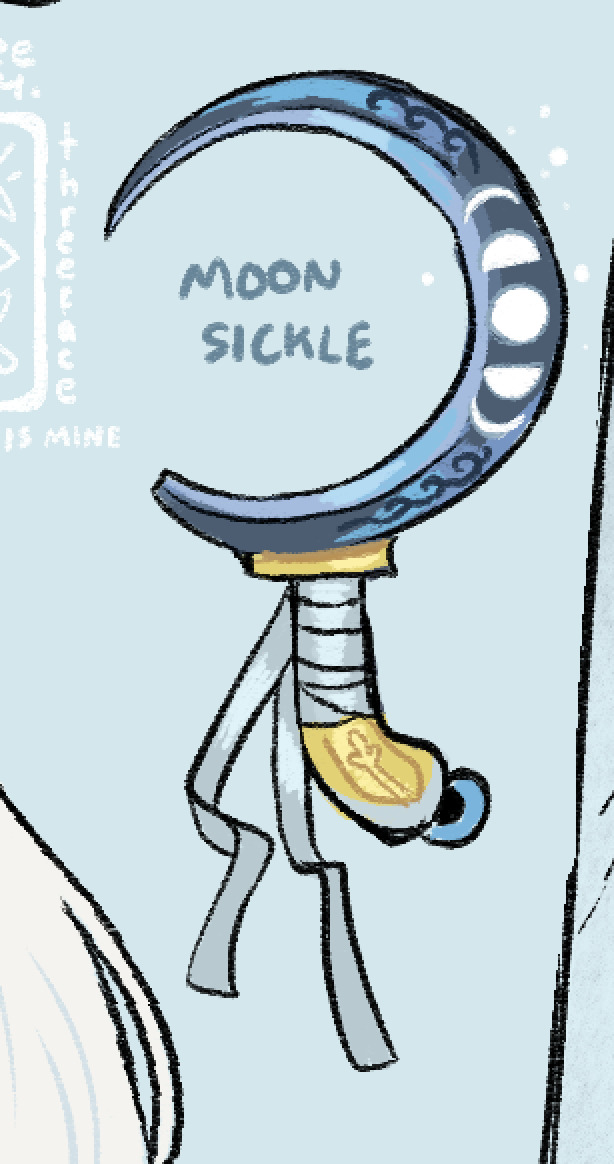


Finally made a sheng reference! Now I won't make tiny continuity mistakes!
42K notes
·
View notes
